初中英语-复合句
初中英语语法主从复合句
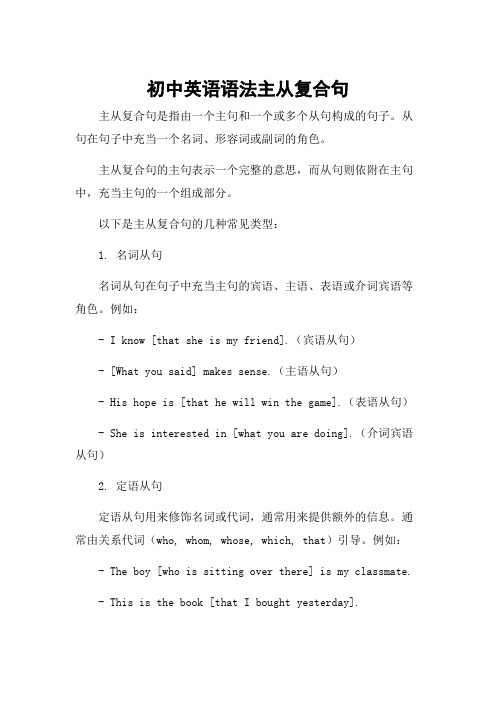
初中英语语法主从复合句主从复合句是指由一个主句和一个或多个从句构成的句子。
从句在句子中充当一个名词、形容词或副词的角色。
主从复合句的主句表示一个完整的意思,而从句则依附在主句中,充当主句的一个组成部分。
以下是主从复合句的几种常见类型:1. 名词从句名词从句在句子中充当主句的宾语、主语、表语或介词宾语等角色。
例如:- I know [that she is my friend].(宾语从句)- [What you said] makes sense.(主语从句)- His hope is [that he will win the game].(表语从句)- She is interested in [what you are doing].(介词宾语从句)2. 定语从句定语从句用来修饰名词或代词,通常用来提供额外的信息。
通常由关系代词(who, whom, whose, which, that)引导。
例如:- The boy [who is sitting over there] is my classmate.- This is the book [that I bought yesterday].- The woman [whose car was stolen] reported it to the police.3. 状语从句状语从句用来修饰主句中的动词,形容词或副词,提供额外的信息。
常见的状语从句有时间状语从句、原因状语从句、结果状语从句、条件状语从句和方式状语从句等。
例如:- She went to bed [after she finished her homework].(时间状语从句)- He failed the exam [because he didn't study].(原因状语从句)- They are so tired [that they can't walk anymore].(结果状语从句)- If it rains tomorrow, [we will stay at home].(条件状语从句)- He did it [in the way that she had instructed].(方式状语从句)以上是主从复合句的几种常见类型,。
初中英语-复合句详解
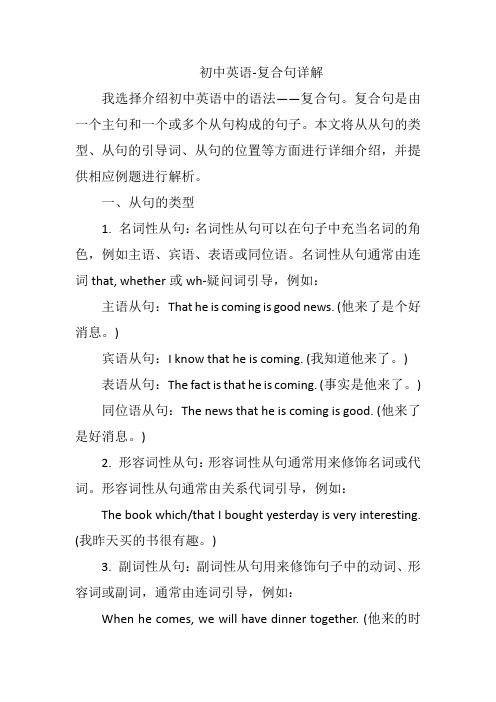
初中英语-复合句详解我选择介绍初中英语中的语法——复合句。
复合句是由一个主句和一个或多个从句构成的句子。
本文将从从句的类型、从句的引导词、从句的位置等方面进行详细介绍,并提供相应例题进行解析。
一、从句的类型1. 名词性从句:名词性从句可以在句子中充当名词的角色,例如主语、宾语、表语或同位语。
名词性从句通常由连词that, whether或wh-疑问词引导,例如:主语从句:That he is coming is good news. (他来了是个好消息。
)宾语从句:I know that he is coming. (我知道他来了。
)表语从句:The fact is that he is coming. (事实是他来了。
)同位语从句:The news that he is coming is good. (他来了是好消息。
)2. 形容词性从句:形容词性从句通常用来修饰名词或代词。
形容词性从句通常由关系代词引导,例如:The book which/that I bought yesterday is very interesting. (我昨天买的书很有趣。
)3. 副词性从句:副词性从句用来修饰句子中的动词、形容词或副词,通常由连词引导,例如:When he comes, we will have dinner together. (他来的时候,我们一起吃晚饭。
)I am happy because I passed the exam. (我很开心,因为我通过了考试。
)二、从句的引导词1. 连词:连词用于连接主句和从句,常见的连词有:that、whether、if、because、since、although、while、when、where、because等。
例如:I know that she is coming. (我知道她来了。
)2. 关系代词:关系代词用于引导形容词性从句,常见的关系代词有:who、whom、whose、which、that等。
初中英语-复合句

初中英语-复合句初中英语语法--复合句本部分内容是中考中必考及常考考点。
考点详解:从句的概念:一个句子在另一个句子中充当成分,充当什么成分就做什么状语。
一、宾语从句1、宾语从句的引导词宾语从句是陈述句时,常用that引导。
在口语中和非正式语言中,可以省略that。
例如:___ us (that) we will have an English test tomorrow.如果宾语从句由一般疑问句转换而来,其引导词用if或whether。
一般情况下,二者可以通用,但从句中有or not或从句充当介词的宾语时,只用whether。
例如:I don’t knowif/whether she will come here。
Sorry。
I don’t know whether hewill come or not.宾语从句是特殊疑问词时,引导词就是特殊疑问词。
例如:Could you tell me where the post office is。
The teacher asked the students what they were doing.2、宾语从句的时态主句的时态是一般现在时,从句的谓语动词的时态要根据具体的情况用相应的任何时态。
例如:Do you know who was talking with at 8 o’clock last night?主句的时态为一般过去时,从句的谓语动词要用相应的某一过去时态。
例如:___ me that he had been to ___.从句表示的是客观真理、普遍现象、自然现象时,从句的时态一律使用一般现在时。
例如:She said the sun rises in the east.3、宾语从句的语序在含有宾语从句的复合句中,宾语从句要使用陈述句语序,“引导词+主语+谓语+其他”。
例如:I want to know when the train left.从句原因状语从句结果状语从句比较状语从句方式状语从句地点状语从句1、疑问句转宾语从句当疑问句由do。
(完整版)初中英语-复合句
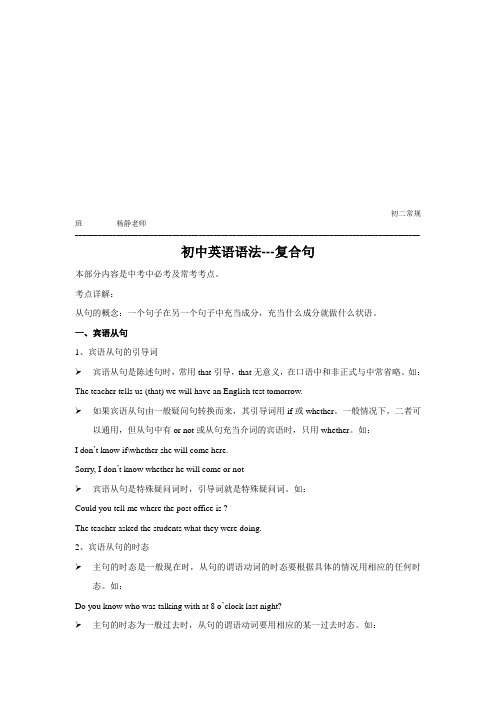
初二常规班杨静老师____________________________________________________________________________________________初中英语语法---复合句本部分内容是中考中必考及常考考点。
考点详解:从句的概念:一个句子在另一个句子中充当成分,充当什么成分就做什么状语。
一、宾语从句1、宾语从句的引导词➢宾语从句是陈述句时,常用that引导,that无意义,在口语中和非正式与中常省略。
如:The teacher tells us (that) we will have an English test tomorrow.➢如果宾语从句由一般疑问句转换而来,其引导词用if或whether。
一般情况下,二者可以通用,但从句中有or not或从句充当介词的宾语时,只用whether。
如:I don’t know if\whether she will come here.Sorry, I don’t know whether he will come or not➢宾语从句是特殊疑问词时,引导词就是特殊疑问词。
如:Could you tell me where the post office is ?The teacher asked the students what they were doing.2、宾语从句的时态➢主句的时态是一般现在时,从句的谓语动词的时态要根据具体的情况用相应的任何时态。
如:Do you know who was talking with at 8 o’clock last night?➢主句的时态为一般过去时,从句的谓语动词要用相应的某一过去时态。
如:初二常规班杨静老师____________________________________________________________________________________________ He told me that he had been to England twice.➢从句表示的是客观真理、普遍现象,自然现象时,从句的时态一律使用一般现在时。
初中英语复合句讲解及例句
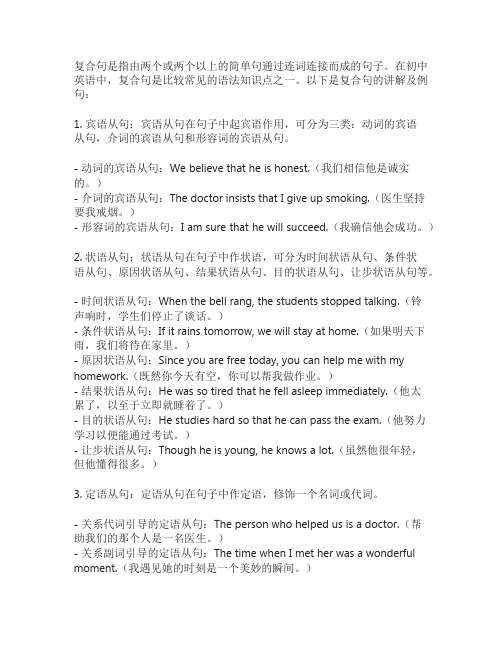
复合句是指由两个或两个以上的简单句通过连词连接而成的句子。
在初中英语中,复合句是比较常见的语法知识点之一。
以下是复合句的讲解及例句:1. 宾语从句:宾语从句在句子中起宾语作用,可分为三类:动词的宾语从句,介词的宾语从句和形容词的宾语从句。
- 动词的宾语从句:We believe that he is honest.(我们相信他是诚实的。
)- 介词的宾语从句:The doctor insists that I give up smoking.(医生坚持要我戒烟。
)- 形容词的宾语从句:I am sure that he will succeed.(我确信他会成功。
)2. 状语从句:状语从句在句子中作状语,可分为时间状语从句、条件状语从句、原因状语从句、结果状语从句、目的状语从句、让步状语从句等。
- 时间状语从句:When the bell rang, the students stopped talking.(铃声响时,学生们停止了谈话。
)- 条件状语从句:If it rains tomorrow, we will stay at home.(如果明天下雨,我们将待在家里。
)- 原因状语从句:Since you are free today, you can help me with my homework.(既然你今天有空,你可以帮我做作业。
)- 结果状语从句:He was so tired that he fell asleep immediately.(他太累了,以至于立即就睡着了。
)- 目的状语从句:He studies hard so that he can pass the exam.(他努力学习以便能通过考试。
)- 让步状语从句:Though he is young, he knows a lot.(虽然他很年轻,但他懂得很多。
)3. 定语从句:定语从句在句子中作定语,修饰一个名词或代词。
初中英语知识点归纳复合句的分类和用法
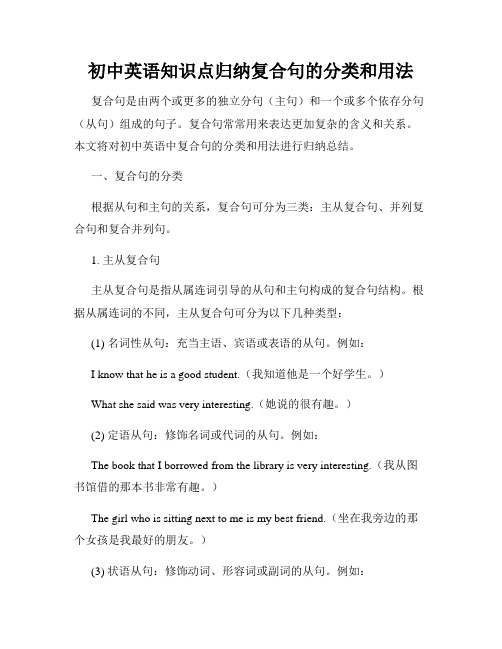
初中英语知识点归纳复合句的分类和用法复合句是由两个或更多的独立分句(主句)和一个或多个依存分句(从句)组成的句子。
复合句常常用来表达更加复杂的含义和关系。
本文将对初中英语中复合句的分类和用法进行归纳总结。
一、复合句的分类根据从句和主句的关系,复合句可分为三类:主从复合句、并列复合句和复合并列句。
1. 主从复合句主从复合句是指从属连词引导的从句和主句构成的复合句结构。
根据从属连词的不同,主从复合句可分为以下几种类型:(1) 名词性从句:充当主语、宾语或表语的从句。
例如:I know that he is a good student.(我知道他是一个好学生。
)What she said was very interesting.(她说的很有趣。
)(2) 定语从句:修饰名词或代词的从句。
例如:The book that I borrowed from the library is very interesting.(我从图书馆借的那本书非常有趣。
)The girl who is sitting next to me is my best friend.(坐在我旁边的那个女孩是我最好的朋友。
)(3) 状语从句:修饰动词、形容词或副词的从句。
例如:He will call me when he arrives.(他到达时会给我打电话。
)She is happy because she passed the exam.(她因为通过了考试而很开心。
)2. 并列复合句并列复合句是由两个或更多的并列分句构成的复合句结构,表示并列关系。
主要有以下几种形式:(1) 并列连词连接:用于连接并列分句的连词有and、or、but等。
例如:I like apples and she likes oranges.(我喜欢苹果,她喜欢橙子。
)You can go home or you can stay here.(你可以回家或者留在这里。
并列复合句(18张PPT)初中英语专项复习课件

初中英语专项复习
并列复合句的定义
• 并列复合句是由两个或两个以上并列而又独立的 简单句构成的句子。这两个简单句常由并列连接 词连在一起,但有时不用连接词,只在两个简单 句之间用一逗号或分号。并列复合句是复合句的 三种基本类型之一,另外两种分别是主从复合句 和错综复合句。
并列连词的类型
• 并列连词主要有以下几种类型: • 表示并列关系的连词:and(和),both ...
巩固与练习
• _______ the day went on, _______ the sun got hotter and hotter.
• A. With; the B. As; the C. As; a D. With; a • 答案:B
巩固与练习
• _______ the Internet is bridging the distance between people, it may also be creating more distance between them.
并列复合句的时态与语态
• 时态一致性原则:在并列复合句中,如果主句和 从句的时间概念不一致,就需要采用不同的时态 来表示。例如,如果主句使用现在时,从句中可 以使用过去时来表示过去的某个时间点。此外, 在表示对比关系时,也可以采用不一致的时态来 强调对比
并列复合句的时态与语态
• 语态一致性原则:在并列复合句中,主句和从句 的语态(主动语态或被动语态)应该保持一致。 如果主句使用被动语态,从句也应该使用被动语 态;如果主句使用主动语态,从句也应该使用主析并列复合句时,应注意各个简单句之间的逻辑关系,以 及并列连词的选择和使用。同时,应遵循时态一致性和语态一 致性的原则,以确保句子的准确性和流畅性。在某些情况下, 为了强调对比或突出某种含义,也可以故意打破时态和语态的 一致性。
初中英语复合句
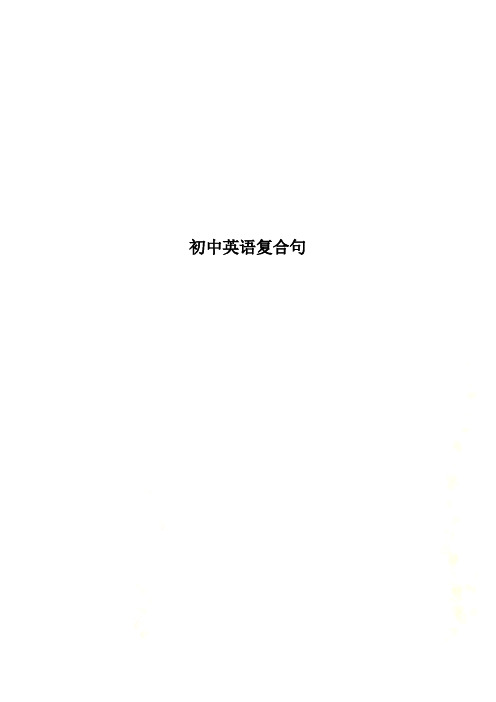
初中英语复合句初中英语复合句英语中的复合句往往是学生学习的难点,因为句式复杂多变,而且主谓宾、定状补等句子成分运用到具体的句子中需要一定的语法知识作为基础,所以,一些学生以看到这些复杂的句式就会一个头变两个大。
复合句(Complex Sentence)由一个主句(Principal Clause)和一个或一个以上的从句(Subordinate Clause)构成。
下面我们就一起来看看复合句的有关语法知识。
主句是全句的主体,通常可以独立存在;从句则是一个句子成分,不能独立存在。
从句不能单独成句,但它也有主语部分和谓语部分,就像一个句子一样。
所不同在于,从句须由一个关联词(connective)引导。
1、名词性从句在句子中起名词作用的句子叫名词性从句(Noun Clauses)。
名词性从句的功能相当于名词词组, 它在复合句中能担任主语、宾语、表语、同位语、介词宾语等,因此根据它在句中不同的语法功能,名词性从句又可分别称为主语从句、宾语从句、表语从句和同位语从句。
1)主语从句作句子主语的从句叫主语从句。
主语从句通常由从属连词that,whether,if和连接代词what,who,which,whatever,whoever以及连接副词how,when,where,why等词引导。
that在句中无词义,只起连接作用;连接代词和连接副词在句中既保留自己的疑问含义、又起连接作用,在从句中充当从句的成分。
例如:What he wants to tell us is not clear. 他要跟我们说什么,还不清楚。
Who will win the match is still unknown. 谁能赢得这场比赛还不得而知。
It is known to us how he became a writer. 我们都知道他是如何成为一名作家的。
Where the English evening will be held has not yet been announced. 英语晚会将在哪里举行,还没有宣布。
初中英语复合句知识点总结
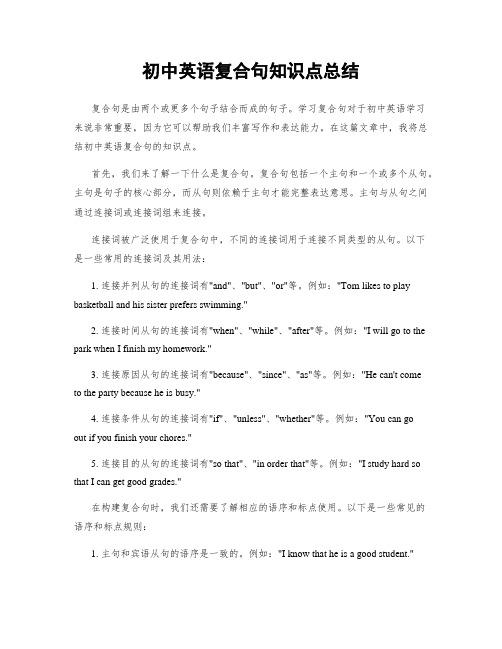
初中英语复合句知识点总结复合句是由两个或更多个句子结合而成的句子。
学习复合句对于初中英语学习来说非常重要,因为它可以帮助我们丰富写作和表达能力。
在这篇文章中,我将总结初中英语复合句的知识点。
首先,我们来了解一下什么是复合句。
复合句包括一个主句和一个或多个从句。
主句是句子的核心部分,而从句则依赖于主句才能完整表达意思。
主句与从句之间通过连接词或连接词组来连接。
连接词被广泛使用于复合句中,不同的连接词用于连接不同类型的从句。
以下是一些常用的连接词及其用法:1. 连接并列从句的连接词有"and"、"but"、"or"等。
例如:"Tom likes to play basketball and his sister prefers swimming."2. 连接时间从句的连接词有"when"、"while"、"after"等。
例如:"I will go to the park when I finish my homework."3. 连接原因从句的连接词有"because"、"since"、"as"等。
例如:"He can't cometo the party because he is busy."4. 连接条件从句的连接词有"if"、"unless"、"whether"等。
例如:"You can goout if you finish your chores."5. 连接目的从句的连接词有"so that"、"in order that"等。
初中英语句子结构分析

初中英语句子结构分析
1.简单句结构:
-主语+谓语
- 例:I like ice cream.(我喜欢冰淇淋。
)
2.并列句结构:
-主句+连词+主句
- 例:I am tired, but I need to finish my homework.(我很累,但我需要完成作业。
)
3.复合句结构:
-主句(主语+谓语)+从句
- 例:I will go to bed early tonight because I have an important test tomorrow.(因为明天我有一场重要的考试,所以今晚我
会早点睡。
)
在复合句中,从句可以是名词性从句、定语从句或状语从句,根据从
句的功能和位置可以有不同的结构。
以下是一些常见的复合句结构:
-名词性从句结构:
- 主句 + 连词 + that/whether/if + 从句
-定语从句结构:
-主句(含有被修饰的名词)+连词+从句(修饰主句中的名词)
- 例:The book that he borrowed from the library is very interesting.(他从图书馆借的那本书非常有趣。
)
-状语从句结构:
-主句+连词+从句(修饰主句的动词、形容词、副词等)
- 例:I will go swimming after I finish my homework.(我完成作业后会去游泳。
)
需要注意的是,英语句子的结构可以根据需要自由组合,可以省略一些成分,也可以添加修饰、插入语等来丰富句子的表达。
初中英语复合句专题(共29张PPT)

I don’t know if/whether___i_t _is__g_o_in_g__to__r_a_in_._
是否将要下雨
Note: 只用whether的四种情况:
1. 在介词后
I’ m thinking of whether we should go fishing.
2. 直接与or not连用时
(他想要和你通话)
I’m sorry (that)____h_e_i_sn_’_t_h_e_r_e_r_ig_h_t_n_ow.
他现在不在这里
that本身无意义,不充当任何成分,常被省略
Note:
1.宾语从句的否定转移:
主句是I/We think/suppose/guess/believe等时,从句中的否定 习惯上要转移到主句中。
Note: allow us to do.
I’ll never forget the day when I joined the League. I don’t know if/whether__________________
for是并列连词,引导的句子不置于句首,是一种非直接的、 This is Tom.
Ⅰ. The Object Clause (宾语从句)
宾语从句是英语复合句中用来充当宾 语的句子。
宾语从句一般由“引导词+主语+谓语+其 它”构成,其语序是陈述句语序.
1. that+陈述句的宾语从句 例如: He says that___h_e_w__a_n_ts__to__s_p_e_a_k_t_o_y_o_u. .
e.g. If he doesn’t come on time, we won’t know what to know.
初中英语五大基本句型
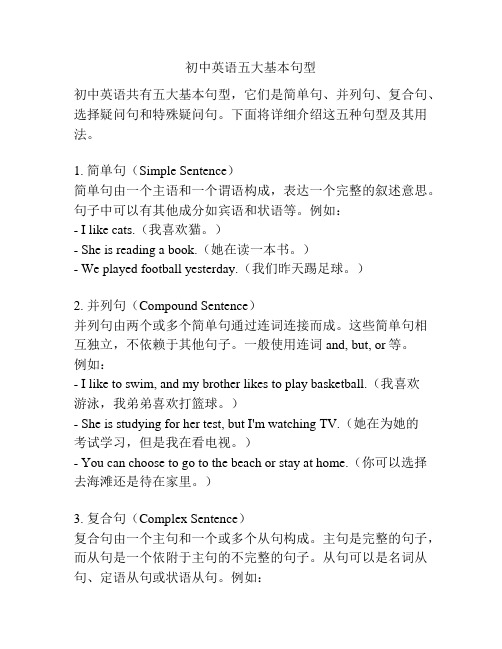
初中英语五大基本句型初中英语共有五大基本句型,它们是简单句、并列句、复合句、选择疑问句和特殊疑问句。
下面将详细介绍这五种句型及其用法。
1. 简单句(Simple Sentence)简单句由一个主语和一个谓语构成,表达一个完整的叙述意思。
句子中可以有其他成分如宾语和状语等。
例如:- I like cats.(我喜欢猫。
)- She is reading a book.(她在读一本书。
)- We played football yesterday.(我们昨天踢足球。
)2. 并列句(Compound Sentence)并列句由两个或多个简单句通过连词连接而成。
这些简单句相互独立,不依赖于其他句子。
一般使用连词and, but, or等。
例如:- I like to swim, and my brother likes to play basketball.(我喜欢游泳,我弟弟喜欢打篮球。
)- She is studying for her test, but I'm watching TV.(她在为她的考试学习,但是我在看电视。
)- You can choose to go to the beach or stay at home.(你可以选择去海滩还是待在家里。
)3. 复合句(Complex Sentence)复合句由一个主句和一个或多个从句构成。
主句是完整的句子,而从句是一个依附于主句的不完整的句子。
从句可以是名词从句、定语从句或状语从句。
例如:- I know that she is coming to visit us tomorrow.(我知道她明天要来看我们。
)- The book that I borrowed from the library is very interesting.(我从图书馆借的那本书很有趣。
)- We will go to the park if it doesn't rain tomorrow.(如果明天不下雨,我们会去公园。
初中英语复合句例句100个
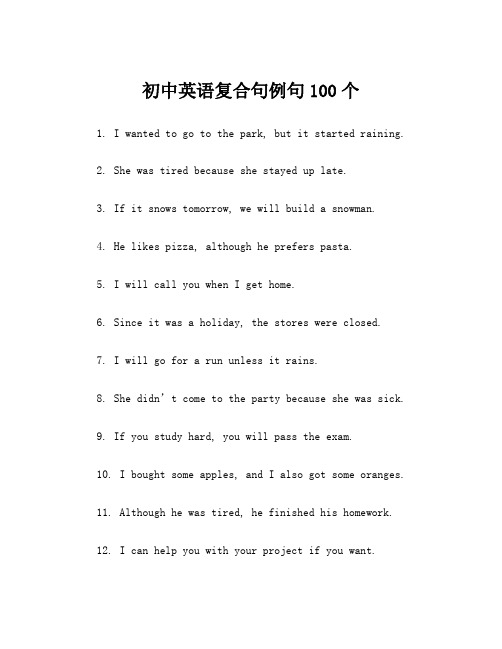
初中英语复合句例句100个1. I wanted to go to the park, but it started raining.2. She was tired because she stayed up late.3. If it snows tomorrow, we will build a snowman.4. He likes pizza, although he prefers pasta.5. I will call you when I get home.6. Since it was a holiday, the stores were closed.7. I will go for a run unless it rains.8. She didn’t come to the party because she was sick.9. If you study hard, you will pass the exam.10. I bought some apples, and I also got some oranges.11. Although he was tired, he finished his homework.12. I can help you with your project if you want.13. She likes reading books, but she doesn’t have much time.14. He plays basketball whenever he gets the chance.15. I will help you with your work, provided that you ask.16. While I was cooking, the phone rang.17. I can’t go out because I have to study.18. We went to the beach although it was cold.19. I’ll bring my camera if you bring your tripod.20. She sings beautifully, and she dances well, too.21. If you finish your homework, we can watch a movie.22. Although it was late, they decided to continue.23. I want to travel, but I don’t have enough money.24. Since he loves music, he plays the guitar every day.25. I was surprised when I saw her at the concert.26. I’ll join you for dinner unless something comes up.27. Even though it was hard, she didn’t give up.28. I will buy a gift for her birthday if I have time.29. She studied hard so that she could pass the exam.30. I prefer tea over coffee, but sometimes I drink both.31. Whenever I go to the mall, I buy something new.32. We’ll go hiking unless it rains tomorrow.33. I finished my chores before I went to bed.34. If you need help, just let me know.35. Although it was expensive, I decided to buy it.36. He didn’t come to the meeting because he was busy.37. Since it’s your birthday, we should celebrate.38. I’ll take the bus unless I can get a ride.39. I enjoy playing video games when I have free time.40. She was happy because she received good news.41. If you want to join us, you are welcome.42. Even if it’s raining, we will go for a walk.43. I will finish my homework before I go out.44. Although they argued, they remained friends.45. I will read a book while I wait for you.46. If it’s sunny tomorrow, we will have a picnic.47. She likes to swim, but she is afraid of deep water.48. I was tired, yet I decided to go out.49. I can’t believe that you finished your project early!50. While I was walking, I saw a beautiful bird.51. I’ll call you as soon as I arrive.52. If you want to succeed, you must work hard.53. Although it’s difficult, I will try my best.54. I bought a new dress because I have a party.55. He studies every night so that he can improve.56. Even though he’s young, he is very talented.57. If you see her, please tell her to call me.58. She enjoys painting, and she takes classes for it.59. I will stay home unless you want me to come.60. Since it’s late, we should go home.61. I will eat dinner after I finish my homework.62. Although it was raining, they went for a hike.63. I’ll help you with the project as long as you help me.64. If I had time, I would learn a new language.65. While she was studying, her brother was playing video games.66. I will go shopping if I have enough money.67. Even though it was a tough decision, I made it.68. I’ll wait for you until you’re ready.69. She is going to the concert unless she gets sick.70. I like to play soccer, but I also enjoy basketball.71. If you practice every day, you will improve.72. Although he is busy, he always finds time for friends.73. I will finish this book before I start another one.74. If you study well, you will do great on the test.75. While I was cleaning, I found my old toys.76. I will go to bed early so that I can wake up refreshed.77. Even if it’s cold, I like to go outside.78. Since he’s allergic to cats, he can’t have one.79. I’ll bring snacks for the movie if you bring drinks.80. Although she was nervous, she gave a great speech.81. I want to learn how to cook because I love food.82. If you don’t understand, please ask me.83. I was excited when I heard the news.84. I will watch TV after I finish my homework.85. Since it’s a holiday, we don’t have school.86. I like chocolate, but I prefer vanilla ice cream.87. If it’s not too late, we can go for ice cream.88. Although it was hot, we enjoyed the beach.89. I will practice my speech until I feel confident.90. If you are free this weekend, let’s hang out.91. She reads every night because she loves stories.92. I’ll go to the gym after I finish work.93. Even though he’s tired, he wants to play.94. If I win the lottery, I will travel the world.95. She likes to jog in the morning whenever she can.96. I will help you with your homework if you help me later.97. Since it’s her favorite show, she never misses it.98. I was happy to see my old friend after so long.99. If you want to learn, you must practice regularly.100. Although he had a rough day, he smiled at everyone.。
初中英语语法主从复合句
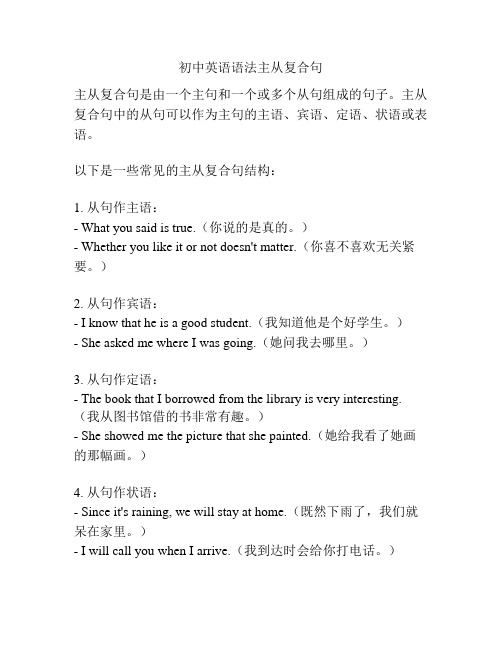
初中英语语法主从复合句主从复合句是由一个主句和一个或多个从句组成的句子。
主从复合句中的从句可以作为主句的主语、宾语、定语、状语或表语。
以下是一些常见的主从复合句结构:1. 从句作主语:- What you said is true.(你说的是真的。
)- Whether you like it or not doesn't matter.(你喜不喜欢无关紧要。
)2. 从句作宾语:- I know that he is a good student.(我知道他是个好学生。
)- She asked me where I was going.(她问我去哪里。
)3. 从句作定语:- The book that I borrowed from the library is very interesting.(我从图书馆借的书非常有趣。
)- She showed me the picture that she painted.(她给我看了她画的那幅画。
)4. 从句作状语:- Since it's raining, we will stay at home.(既然下雨了,我们就呆在家里。
)- I will call you when I arrive.(我到达时会给你打电话。
)5. 从句作表语:- His dream is that he wants to become a doctor.(他的梦想是想成为一名医生。
)- The fact is that he didn't pass the exam.(事实是他考试没通过。
)需要注意的是,从句和主句之间的关系要用适当的连词连接起来,如that, whether, while, when, because, if等。
此外,从句的动词形式和时态也要根据上下文的需要进行调整。
希望这些例句可以帮助你理解主从复合句的用法。
如果有任何问题,请随时向我提问。
初中英语知识点总结:复合句
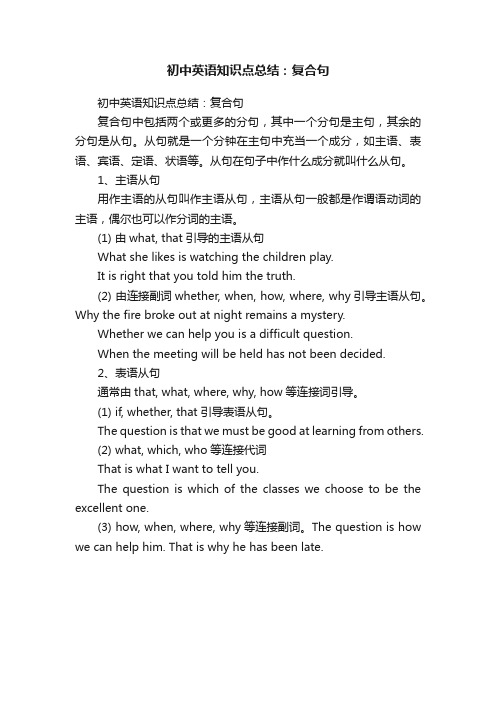
初中英语知识点总结:复合句初中英语知识点总结:复合句复合句中包括两个或更多的分句,其中一个分句是主句,其余的分句是从句。
从句就是一个分钟在主句中充当一个成分,如主语、表语、宾语、定语、状语等。
从句在句子中作什么成分就叫什么从句。
1、主语从句用作主语的从句叫作主语从句,主语从句一般都是作谓语动词的主语,偶尔也可以作分词的主语。
(1) 由what, that引导的主语从句What she likes is watching the children play.It is right that you told him the truth.(2) 由连接副词whether, when, how, where, why引导主语从句。
Why the fire broke out at night remains a mystery.Whether we can help you is a difficult question.When the meeting will be held has not been decided.2、表语从句通常由that, what, where, why, how等连接词引导。
(1) if, whether, that引导表语从句。
The question is that we must be good at learning from others.(2) what, which, who等连接代词That is what I want to tell you.The question is which of the classes we choose to be the excellent one.(3) how, when, where, why等连接副词。
The question is how we can help him. That is why he has been late.。
初中英语知识点归纳简单句和复合句的构成
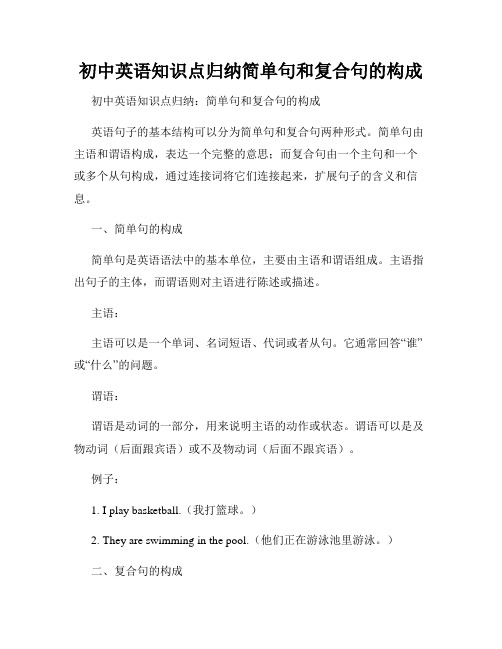
初中英语知识点归纳简单句和复合句的构成初中英语知识点归纳:简单句和复合句的构成英语句子的基本结构可以分为简单句和复合句两种形式。
简单句由主语和谓语构成,表达一个完整的意思;而复合句由一个主句和一个或多个从句构成,通过连接词将它们连接起来,扩展句子的含义和信息。
一、简单句的构成简单句是英语语法中的基本单位,主要由主语和谓语组成。
主语指出句子的主体,而谓语则对主语进行陈述或描述。
主语:主语可以是一个单词、名词短语、代词或者从句。
它通常回答“谁”或“什么”的问题。
谓语:谓语是动词的一部分,用来说明主语的动作或状态。
谓语可以是及物动词(后面跟宾语)或不及物动词(后面不跟宾语)。
例子:1. I play basketball.(我打篮球。
)2. They are swimming in the pool.(他们正在游泳池里游泳。
)二、复合句的构成复合句是由主句和一个或多个从句组成的句子。
主句独立存在,而从句则依赖于主句来完成意思。
从句:从句是由连接词引导起来的句子,在复合句中充当特定的语法角色。
常见的从句有名词性从句、定语从句和状语从句。
连接词:连接词用于引导从句,根据从句的类型有不同的连接词。
如:“that, if, whether”引导名词性从句,“which, who, whom, whose, that”引导定语从句,“when, while, since, until”引导状语从句等。
例子:1. She said that she would come.(她说她会来。
)2. I don't know who he is.(我不知道他是谁。
)三、简单句和复合句的比较简单句和复合句在表达能力和信息量上有所不同。
简单句通常用来表达简单的观点、事实或描述。
它直接明了,简洁明了。
然而,简单句的信息量有限,不能很好地表达复杂的关系和逻辑。
相比之下,复合句更加丰富和灵活,能够在一个句子中表达多个观点和信息。
初中英语-复合句(可编辑修改版)
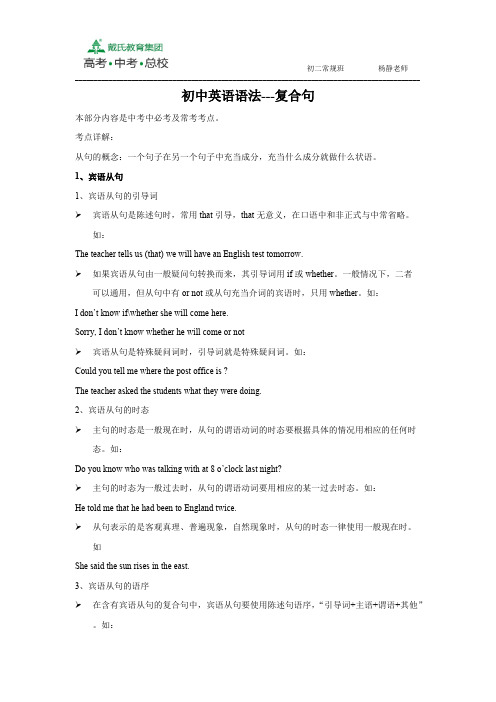
____________________________________________________________________________________________初中英语语法---复合句本部分内容是中考中必考及常考考点。
考点详解:从句的概念:一个句子在另一个句子中充当成分,充当什么成分就做什么状语。
1、宾语从句1、宾语从句的引导词宾语从句是陈述句时,常用that引导,that无意义,在口语中和非正式与中常省略。
如:The teacher tells us (that) we will have an English test tomorrow.如果宾语从句由一般疑问句转换而来,其引导词用if或whether。
一般情况下,二者可以通用,但从句中有or not或从句充当介词的宾语时,只用whether。
如:I don’t know if\whether she will come here.Sorry, I don’t know whether he will come or not宾语从句是特殊疑问词时,引导词就是特殊疑问词。
如:Could you tell me where the post office is ?The teacher asked the students what they were doing.2、宾语从句的时态主句的时态是一般现在时,从句的谓语动词的时态要根据具体的情况用相应的任何时态。
如:Do you know who was talking with at 8 o’clock last night?主句的时态为一般过去时,从句的谓语动词要用相应的某一过去时态。
如:He told me that he had been to England twice.从句表示的是客观真理、普遍现象,自然现象时,从句的时态一律使用一般现在时。
如She said the sun rises in the east.3、宾语从句的语序在含有宾语从句的复合句中,宾语从句要使用陈述句语序,“引导词+主语+谓语+其他”。
英文复合句

英文复合句好的,以下是为您生成的20 个关于英语学习的内容,包括复合句、英语释义、短语、单词、用法和双语例句:---1. 复合句:The man who is standing over there is my teacher. (站在那边的那个人是我的老师。
)- 英语释义:A complex sentence is a sentence that contains an independent clause and one or more dependent clauses.- 短语:stand over there(站在那边)- 单词:independent(独立的);dependent(依赖的)- 用法:“who is standing over there”是一个定语从句,修饰先行词“the man”。
- 双语例句:I know the girl who sings very well. (我认识那个唱歌很好的女孩。
)2. 复合句:I will not go to the party if it rains tomorrow. (如果明天下雨,我就不去参加聚会。
)- 英语释义:In this sentence, "if it rains tomorrow" is a conditional clause.- 短语:go to the party(去参加聚会)- 单词:conditional(条件的)- 用法:这是一个条件状语从句,遵循“主将从现”原则。
- 双语例句:He will come if you invite him. (如果你邀请他,他会来的。
)3. 复合句:Although he is very tired, he still keeps working. (虽然他很累,但他仍然继续工作。
)- 英语释义:"Although" is a conjunction used to introduce a concessive clause.- 短语:keep working(继续工作)- 单词:concessive(让步的)- 用法:although 引导的让步状语从句,不能与 but 连用。
初中英语复合句归纳
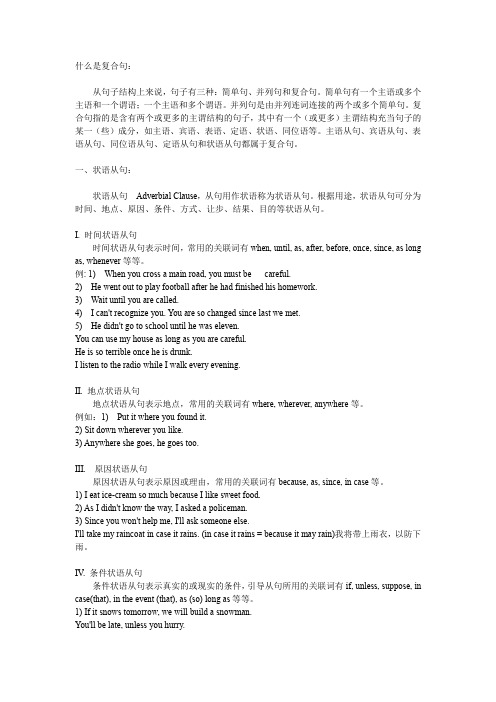
什么是复合句:从句子结构上来说,句子有三种:简单句、并列句和复合句。
简单句有一个主语或多个主语和一个谓语;一个主语和多个谓语。
并列句是由并列连词连接的两个或多个简单句。
复合句指的是含有两个或更多的主谓结构的句子,其中有一个(或更多)主谓结构充当句子的某一(些)成分,如主语、宾语、表语、定语、状语、同位语等。
主语从句、宾语从句、表语从句、同位语从句、定语从句和状语从句都属于复合句。
一、状语从句:状语从句Adverbial Clause,从句用作状语称为状语从句。
根据用途,状语从句可分为时间、地点、原因、条件、方式、让步、结果、目的等状语从句。
I. 时间状语从句时间状语从句表示时间,常用的关联词有when, until, as, after, before, once, since, as long as, whenever等等。
例: 1) When you cross a main road, you must be careful.2) He went out to play football after he had finished his homework.3) Wait until you are called.4) I can't recognize you. You are so changed since last we met.5) He didn't go to school until he was eleven.You can use my house as long as you are careful.He is so terrible once he is drunk.I listen to the radio while I walk every evening.II. 地点状语从句地点状语从句表示地点,常用的关联词有where, wherever, anywhere等。
初中英语专题:主从复合句 (名词性从句 +定语从句 +宾语从句 +状语从句 )

初中英语专题:主从复合句名词性从句 +定语从句 +宾语从句 +状语从句1.The mountains were____big____it took Yu Gong along time to walk the other side.A.so; that B.too; to C.not; until D.enough; to全面解析:so; that"如此……以至于……",用于连接两个句子,表示前一个句子所描述的情况导致了后一个句子所描述的结果。
too; to"太……而不能……"表示某物或某人因为过度或过量而不能达到某种状态或做某事。
not; until"直到……才……"用于描述某个动作或事件在另一个时间或条件发生之前一直没有发生,enough; to"足够……以至于……"表示某物或某人具有足够的某种性质或能力,以至于可以做某事。
根据句意可知,此处选择so ... that最符合题意,"so big"描述了山的大小,而"that it took Yu Gong a long time to walk to the other side"则是一个结果状语从句,说明了由于山的大小,愚公需要花费很长时间才能走到山的另一边,故答案为A。
2.Do you know____?A.what's the population of LuzhouB.how's the population of LuzhouC.what the population of Luzhou isD.how the population of Luzhou is全面解析:3.You must clean your room ____ your mother comes back.A.after B.but C.before D.and全面解析:after在……之后;but但是;before在……之前;and和。
- 1、下载文档前请自行甄别文档内容的完整性,平台不提供额外的编辑、内容补充、找答案等附加服务。
- 2、"仅部分预览"的文档,不可在线预览部分如存在完整性等问题,可反馈申请退款(可完整预览的文档不适用该条件!)。
- 3、如文档侵犯您的权益,请联系客服反馈,我们会尽快为您处理(人工客服工作时间:9:00-18:30)。
初中英语语法---复合句本部分内容是中考中必考及常考考点。
考点详解:从句的概念:一个句子在另一个句子中充当成分,充当什么成分就做什么状语。
一、宾语从句1、宾语从句的引导词➢宾语从句是陈述句时,常用that引导,that无意义,在口语中和非正式与中常省略。
如:The teacher tells us (that) we will have an English test tomorrow.➢如果宾语从句由一般疑问句转换而来,其引导词用if或whether。
一般情况下,二者可以通用,但从句中有or not或从句充当介词的宾语时,只用whether。
如:I don’t know if\whether she will come here.Sorry, I don’t know whether he will come or not➢宾语从句是特殊疑问词时,引导词就是特殊疑问词。
如:Could you tell me where the post office is ?The teacher asked the students what they were doing.2、宾语从句的时态➢主句的时态是一般现在时,从句的谓语动词的时态要根据具体的情况用相应的任何时态。
如:Do you know who was talking with at 8 o’clock last night?➢主句的时态为一般过去时,从句的谓语动词要用相应的某一过去时态。
如:He told me that he had been to England twice.➢从句表示的是客观真理、普遍现象,自然现象时,从句的时态一律使用一般现在时。
如She said the sun rises in the east.3、宾语从句的语序➢在含有宾语从句的复合句中,宾语从句要使用陈述句语序,“引导词+主语+谓语+其他”。
如:I want to know when the train left.➢由do,does,did构成的疑问句,在装换成宾语从句时,要去电do,does,did,且从句中的谓语动词要根据主句时态作出相应的变化。
如:Does he sing well ? The music teacher asked him.---> The music teacher asked him if (whether) he sang well.➢如果是will,be , have ,can组成的疑问句,在变为宾语从句时,要把这些词还原到谓语位置上,并根据主句的时态作相应的变化。
如:Will you be free tomorrow ? She asked me.---> She asked me if (whether) I would be free tomorrow.4、宾语从句的简化➢当宾语从句的主语和主句的主语相同时,且主句的谓语动词时hope,wish,decide,agree,choose等时,从句可以简化为不定式。
I hope that I can receive your e-mail.=I hope to receive you e-mail.➢当宾语从句的主语和主句的主语相同,且主句的谓语动词是know,remember,forget,learn等时,从句可简化为“疑问句+不定式”。
She doesn’t know what she should do next.=She doesn’t know what to do next.5、否定转移在主从复合句中,当主句的主语为第一人称时,谓语动词时think,believe,suppose等时,要将从句的否定词转移到主句中,即主句的谓语动词用否定形式,而从句的谓语动词用肯定形式。
I don’t think he will come with you.时间状语从句(1)当主句是一般将来时态或祈使句,表示将来的意义时,从句通常用一般将来时,简称“主将从现”。
如:I’ll ring you as soon as I get up.(2)when 引导的时间状语从句,通常表示主句和从句的动作同时发生;before表示主句的动作发生在从句之前;after则表示主句的动作发生在从句之后;as引导的时间状语从句,往往表示主句和从句的动作同时发生,不分先后。
(3)until和till引导的时间状语从句。
①主句的谓语动词是延续性动词时,主句用肯定形式,表示这一动作或状态一直延续到until\till所表示的时间为止。
如:I’ll wait for you till you come to see me.②主句的谓语动词时非延续性动词时,用否定形式表示主句的动作直到until所表示的时间才发生。
构成句式not...until, 有时不用not,而用其他如never,nothing等表示否定意义的词。
如:I didn’t go to bed until I finished my homework.(4)since引导的时间状语从句,表示“自.....以来”,主句用一般现在时或现在完成时,从句用一般过去时。
机构为:It has been...since+从句\It is ....since+从句。
如:I have worked in this school since I graduated from Beijing University.It is 10 years since I began to study English.条件状语从句(1)主句为一般将来时,从句用一般现在时。
如:I’ll visit the Great Wall if it doesn’t rain tomorrow.(2)如果if引导的条件状语从句所表示的前提或条件将来可以实现或正在进行,从句要用现在完成时或进行时,主句通常用将来时。
如:We will give you a good price if you are thinking of buying it.(3)”祈使句+and\or+陈述句”中,祈使句在意义上相当于一个条件状语从句。
如:Use your head, and you’ll find a way.=If you use your head ,you’ll find a way.原因状语从句(1)原因状语从句通常用because、since、as引导。
这三个词所表示的语气依次减弱,用why提问用because来回答。
如:I did that because she told me .(2)如果状语从句所表示的原因是人们已知的事实,就要用since,而不用as或because。
Since在这里的意思是“既然”。
如:Since you can’t answer the question, you can ask someone for help.目的状语从句(1)引导目的状语从句的词或词组有so that,in order that等,谓语中常含有may,might,can,could,will,would等情态动词。
如:He must get up early so that he can go to work on time.(2)当从句主语与主句主语一致时,可用so as to, in order to .如:He worked day and night in order that he could succeed.=He worked day and night in order to succeed.结果状语从句(1)由so...that, such...that引导,其区别:①So+adj\adv+that②Such+a\an+(adj+)单数名词+that③Such+(adj+)复数名词+that④Such +(adj+)不可数名词+that⑤So +adj+a\an+单数名词+that当名词前有many或much修饰时,用so而不用such。
如:She is such a lovely girl that we love her very much.=She is so lovely a girl that we love her very much.We have so much time that we can finish the work very well.(2)so...that 句型的否定形式可用简单句too...to或not...enough to代替。
The peach is so sour that we can’t eat it.= The peach is too sour to eat.=The peach is not sweet enough to eat.三、定语从句含有定语从句的复合句的基本结构:先行词+关系词+定语从句。
定语从句的关关系代词的用法一般情况下,that既可指人又可指物,可以代替who,whom和which,在从句中作主语,表语或谓语动词的宾语,但不能放于介词后,作介词的宾语;which 指物,在从句中作主语、表语或谓语动词及介词的宾语;who在从句中作主语、表语或宾语;whom在从句中宾语;whose在从句中作定语。
如:A doctor is a personwholooks afterpeople’s health.先行词主语谓语宾语Who下列情况中,先行词指物时,只能用that引导,不能用which:1、先行词时all,little,much,none,everything,nothing等不定代词时。
Is there anything (that) you don’t understand?Tom told his mother all that had happened.2、当先行词有the only,the very,the last等修饰时。
This is the only book that I can find.3、当序数词或形容词最高级修饰先行词时。
This is the best book that I have ever read.4、当先行词有only,all,any修饰时。
I want to read all the books that were written by Lu Xun.5、当主句是以疑问句which开头的特殊疑问句时。
Which is the hotel that you like best?关系代词的省略。
一般情况下that,which,whom作宾语时可以省略,但以下情况不能省略:1、关系代词which,whom在从句中作介词的宾语并且介词谓语关系代词前时,不能省略。
